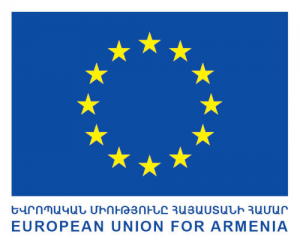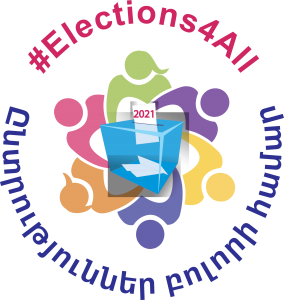 |
 |
 |
On November 14, 2021, local elections were held in Kapan, Ijevan, Stepanavan, Lermontovo and Arzni communities.
The Independent Observer Public Alliance conducted an observation mission during the election campaign and on election day in 32 polling stations and 3 Territorial Electoral Commissions. The observation mission was carried out by 8 long-term observers, 88 short-term observers, including 10 mobile groups, 4 lawyers, 5 data entry operators, 5 observer coordinators and a coordinating team, as well as a communication team.
Two parties were nominated in Kapan and Ijevan communities by the proportional system, and 3 parties were nominated in Stepanavan community. According to the regulations of the Electoral Code, if three parties do not overcome the electoral threshold in the local elections, the third party that received the most votes shall also participate in the distribution of mandates. Accordingly, the parties and alliances nominated in all three communities will be involved in the Council of Elders.
| Community | Nominated parties | Turnout | Results |
| Stepanavan | Prosperous Armenia PartyArmenian National Congress Party
Civil Contract Party |
38․30% | 3․ Civil Contract Party – 81%1․ Prosperous Armenia Party – 14%
2․ Armenian National Congress Party – 4% |
| Kapan | “Shant Alliance” National PartyCivil Contract Party | 63.48% | 1․ “Shant Alliance” National Party – 71%2․ Civil Contract Party – 29% |
| Ijevan | ARF Dashnaktsutyun PartyCivil Contract Party | 37.43% | 2․ Civil Contract Party – 84%1․ ARF Dashnaktsutyun Party – 16% |
Methodology
The Independent Observer Alliance conducted a long-term monitoring through 8 long-term observers from October 23 as part of its observation mission for local elections on November 14, 2021. During the long-term monitoring, 33 pre-election campaign meetings were monitored, during which interviews were conducted with 44 participants. Sixteen candidates for the Council of Elders were interviewed, as well as the chairperson and secretaries of the Territorial Electoral Commissions, 18 chairpersons, secretaries and members of Precinct Electoral Commissions.
Results of the pre-election campaign monitoring
The long-term observation shows that in the three observed communities the pre-election campaign had certain recurring features due to the proportional electoral system:
– In the context of guaranteed membership in the Council of Elders, the parties came up with different political visions and did not rely only on friendly or economic ties.
– Despite the influence of the former community authorities during these local elections, the main political provisions of the campaign of the nominated parties had a significant impact on the formation of the voters’ opinion.
Although the local elections in the three communities were held by proportional representation system, which clearly added political substance to the elections, local factors were reflected in the electoral violations, and this picture was typical of both ruling and opposition political parties.
The campaign in Ijevan and Stepanavan communities was generally passive. In both communities, the campaign widely involved SNCOs, school principals, and heads of social services supporting the ruling party. The pre-election campaign in Kapan community was more active and competitive, which was expressed by the rude vocabulary used by the rival parties during the pre-election campaign.
In this community, there were reciprocal allegations about misuse of administrative resources. The “Shant Alliance” Party also sounded alarms about the pressure on their candidates, which, however, were not substantiated by additional observations. The atmosphere there was partly due to the difficult security environment. The roads connecting the villages and towns of the community have come partially under the control of the Azerbaijani Armed Forces in the recent months, and units of the Azerbaijani Armed Forces appeared in the Kapan-Chakaten section the evening before the vote.
However, the results of both long-term and short-term observations indicate that the impact of the security issue was exaggerated and did not constitute a political divide for the voters of the community.
The observation mission finds that government-funded community-based subsidy programs have been used as a propaganda tool, as such programs start to be more widely covered in communities where local elections are to be held. During the coverage on Public TV, the direct participation of the candidate of the ruling Civil Contract Party in those programs was emphasized in clear propaganda tone, undermining the role of the local authorities representing the opposition party. In Kapan, however, the opposition “Shant Alliance” Party spared no effort to emphasize that the work under the subsidy program was solely the result of their own efforts.
Although the amendments to the Electoral Code have expanded the reporting requirements for campaign expenditures, including the rental of campaign headquarters and campaigning, their implementation is still ineffective, as most election campaign headquarters are not officially presented as such and, hence, are not subject to the law. Moreover, according to observers, the persons involved in the activity of both the aforementioned and official headquarters are presented as volunteers. In this way, the parties avoid declaring the related expenses. This phenomenon can be assessed as widespread.
The most common violations were related to campaign posters, such as posting posters in undefined places, as well as damaging them.
During the monitoring, cases were registered when a person was included in the work of electoral commissions and in the electoral lists without asking for their opinion.
During the election campaign, the Public Television made a number of attempts to organize a televised debate between the candidates running in the Kapan community․ However, these proposals were rejected by the Shant Alliance, interpreting them as unimportant.
Main violations on the voting day
The short-term mission carried out a non-stop observation in 32 out of 99 polling stations formed in the aforementioned communities from 07:00 am on November 14, 2021 until the end of the vote tabulation process. There were 10 mobile groups of observers in those communities. During the voting, the mobile groups visited and observed 72 polling stations. The work of 3 Territorial Electoral Commissions in charge of the elections in the three communities was also observed after 20:00 in the evening.
Long-term and short-term observations were made on the basis of questionnaires evaluating the implementation of the regulations of the electoral legislation.
Isolated violations were observed during the monitoring of the sessions of 35 Precinct Electoral Commissions on the voting day. The conclusions of the “Independent Observer” on this stage were summarized in the references published on November 14 (presenting the situation as of 12:00 and 18:00).
The main violations observed in the polling stations during the voting were related to voting outside of the booth. In particular, in 19 (60%) out of 32 polling stations observed during the voting, cases of putting the ballots in the envelope outside the voting booth were registered, which significantly exceeds the tendency in the elections observed so far. It should be noted, however, that the observers recorded that this was mainly a violation due to lack of knowledge. More than one person entered the voting booth in 25% of the observed polling stations (8 polling stations). These cases were rare in all the mentioned polling stations, and according to the observers, they were also a consequence of lack of knowledge. At the same time, compared to the previous elections, the number of assisted voters was quite low, generally not exceeding 2%.
It should be noted, however, that while it was obvious that it was easier for voters to vote with ballots containing fewer candidates, voters did need to vote in a more convenient manner outside the voting booth, which may be due to vision problems. Meanwhile, the PECs were not provided with magnifying glasses, which could make the voters’ job easier in the existing lighting conditions.
In 6 of the observed polling stations, two or more proxies of parties made an attempt to enter the voting room. In 3 cases they were representatives of the Civil Contract Party, in 2 cases the “Shant Alliance” Party and in 1 case the Prosperous Armenia Party. In the above-mentioned cases, persons not allowed to be present were removed by the PEC chairperson, mainly as a result of the intervention of the observers.
There were campaign posters in the vicinity of 4 of the observed polling stations, and observers in Ijevan community reported that community officials were directing voters in the vicinity of the 38/29 and 38/11 polling stations.
Crowds of people were observed near 10 of the observed polling stations. In almost all cases, they were regular in nature and were eliminated with the intervention of the police․
Organized transportation of voters was observed only in 38/29 polling station of Ijevan community, where the voting of the voters of the nearby Kayan village was organized. According to the incomplete information received about the transfer of those voters, it was organized by the candidate of the Civil Contract Party or to support him.
As for the violations observed during the vote tabulation session, the vote count process in the 41 polling stations observed was generally without violations, but in 2 of the polling stations, there were proxies who were not carrying their badges visibly. Cases of unauthorized persons entering the voting room were observed during the day, but all of them were prevented by the chairpersons of the commissions based on the indication of the observers.
Arguments were registered in only 3 of the observed polling stations. In one case, an argument arose between the commission chairperson and Yerevan.Today reporters over allegedly being representatives of a non-accredited media. In another case, a dispute arose over the demand for voters to wear a mask, and in the third case, the secretary of the commission got into an argument with a visitor representing an international non-governmental organization over procedural issues.
On the day of the voting, the mission submitted one application to register the fact of administrative violation, which was related to the accumulation of cars with campaign posters in Stepanavan community. The cars accompanied the film crew of “Kentron” TV, which testified to the organized campaigning nature of their actions.
During the day, the mission issued a statement on the organization of a coffee break for the members of the commissions by the candidate of the Civil Contract Party in Stepanavan community, which the mission assesses as interference with the impartiality of the PECs.
Conclusions
The elections on November 14, 2021 were the second local elections held under a changed electoral system for local elections.
We consider that the observed violations did not have a significant impact on the free expression of the will of the voters, they reflect the will of the voters, and the elections meet the criteria of free and fair elections.
Nevertheless, electoral traditions need to be significantly improved in terms of promoting political debates, establishing dialogue and creating an atmosphere of mutual respect between opposing parties.
It will be possible to provide a comprehensive assessment of the full impact of the amendments in the electoral legislation and the required further reforms after the local elections in 38 communities on December 5, but it is already clear that gaps in the legislation are being used by rival parties and there is no proper oversight of the implementation of the new regulations.
Independent Observer Public Alliance, represented by:
Helsinki Citizens’ Assembly Vanadzor Office
Union of Informed Citizens NGO
Progress of Gyumri CSDC
Women’s Rights House NGO
Restart Gyumri – Initiative Center NGO
Direct Democracy NGO
Goris Press Club
The project “Elections4All2021 – Domestic Observations and Citizens Empowerment by Civil Society” is implemented in cooperation with the OxYGen Foundation, the Helsinki Citizens’ Assembly Vanadzor Office, the Union of Informed Citizens NGO and the Yerevan School of Political Studies.
The project is funded by the European Union.

